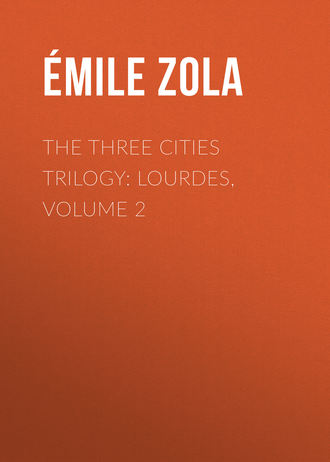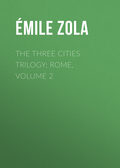
Эмиль Золя
The Three Cities Trilogy: Lourdes, Volume 2
But as soon as the new religion was proscribed, forbidden by the law as an offence, it began to burn with an inextinguishable flame in the depths of every soul. Believers came to the river bank in far greater numbers, fell upon their knees at a short distance from the Grotto, and sobbed aloud as they gazed at the forbidden heaven. And the sick, the poor ailing folks, who were forbidden to seek cure, rushed on the Grotto despite all prohibitions, slipped in whenever they could find an aperture or climbed over the palings when their strength enabled them to do so, in the one ardent desire to steal a little of the water. What! there was a prodigious water in that Grotto, which restored the sight to the blind, which set the infirm erect upon their legs again, which instantaneously healed all ailments; and there were officials cruel enough to put that water under lock and key so that it might not cure any more poor people! Why, it was monstrous! And a cry of hatred arose from all the humble ones, all the disinherited ones who had as much need of the Marvellous as of bread to live! In accordance with a municipal decree, the names of all delinquents were to be taken by the police, and thus one soon beheld a woeful /defile/ of old women and lame men summoned before the Justice of the Peace for the sole offence of taking a little water from the fount of life! They stammered and entreated, at their wit's end when a fine was imposed upon them. And, outside, the crowd was growling; rageful unpopularity was gathering around those magistrates who treated human wretchedness so harshly, those pitiless masters who after taking all the wealth of the world, would not even leave to the poor their dream of the realms beyond, their belief that a beneficent superior power took a maternal interest in them, and was ready to endow them with peace of soul and health of body. One day a whole band of poverty-stricken and ailing folks went to the Mayor, knelt down in his courtyard, and implored him with sobs to allow the Grotto to be reopened; and the words they spoke were so pitiful that all who heard them wept. A mother showed her child who was half-dead; would they let the little one die like that in her arms when there was a source yonder which had saved the children of other mothers? A blind man called attention to his dim eyes; a pale, scrofulous youth displayed the sores on his legs; a paralytic woman sought to join her woeful twisted hands: did the authorities wish to see them all perish, did they refuse them the last divine chance of life, condemned and abandoned as they were by the science of man? And equally great was the distress of the believers, of those who were convinced that a corner of heaven had opened amidst the night of their mournful existences, and who were indignant that they should be deprived of the chimerical delight, the supreme relief for their human and social sufferings, which they found in the belief that the Blessed Virgin had indeed come down from heaven to bring them the priceless balm of her intervention. However, the Mayor was unable to promise anything, and the crowd withdrew weeping, ready for rebellion, as though under the blow of some great act of injustice, an act of idiotic cruelty towards the humble and the simple for which Heaven would assuredly take vengeance.
The struggle went on for several months; and it was an extraordinary spectacle which those sensible men – the Minister, the Prefect, and the Commissary of Police – presented, all animated with the best intentions and contending against the ever-swelling crowd of despairing ones, who would not allow the doors of dreamland to be closed upon them, who would not be shut off from the mystic glimpse of future happiness in which they found consolation for their present wretchedness. The authorities required order, the respect of a discreet religion, the triumph of reason; whereas the need of happiness carried the people off into an enthusiastic desire for cure both in this world and in the next. Oh! to cease suffering, to secure equality in the comforts of life; to march on under the protection of a just and beneficent Mother, to die only to awaken in heaven! And necessarily the burning desire of the multitude, the holy madness of the universal joy, was destined to sweep aside the rigid, morose conceptions of a well-regulated society in which the ever-recurring epidemical attacks of religious hallucination are condemned as prejudicial to good order and healthiness of mind.
The Sainte-Honorine Ward, on hearing the story, likewise revolted. Pierre again had to pause, for many were the stifled exclamations in which the Commissary of Police was likened to Satan and Herod. La Grivotte had sat up on her mattress, stammering: "Ah! the monsters! To behave like that to the Blessed Virgin who has cured me!"
And even Madame Vetu – once more penetrated by a ray of hope amidst the covert certainty she felt that she was going to die – grew angry at the idea that the Grotto would not have existed had the Prefect won the day. "There would have been no pilgrimages," she said, "we should not be here, hundreds of us would not be cured every year."
A fit of stifling came over her, however, and Sister Hyacinthe had to raise her to a sitting posture. Madame de Jonquiere was profiting by the interruption to attend to a young woman afflicted with a spinal complaint, whilst two other women, unable to remain on their beds, so unbearable was the heat, prowled about with short, silent steps, looking quite white in the misty darkness. And from the far end of the ward, where all was black, there resounded a noise of painful breathing, which had been going on without a pause, accompanying Pierre's narrative like a rattle. Elise Rouquet alone was sleeping peacefully, still stretched upon her back, and displaying her disfigured countenance, which was slowly drying.
Midnight had struck a quarter of an hour previously, and Abbe Judaine might arrive at any moment for the communion. Grace was now again descending into Marie's heart, and she was convinced that if the Blessed Virgin had refused to cure her it was, indeed, her own fault in having doubted when she entered the piscina. And she, therefore, repented of her rebellion as of a crime. Could she ever be forgiven? Her pale face sank down among her beautiful fair hair, her eyes filled with tears, and she looked at Pierre with an expression of anguish. "Oh! how wicked I was, my friend," she said. "It was through hearing you relate how that Prefect and those magistrates sinned through pride, that I understood my transgression. One must believe, my friend; there is no happiness outside faith and love."
Then, as Pierre wished to break off at the point which he had reached, they all began protesting and calling for the continuation of his narrative, so that he had to promise to go on to the triumph of the Grotto.
Its entrance remained barred by the palisade, and you had to come secretly at night if you wished to pray and carry off a stolen bottle of water. Still, the fear of rioting increased, for it was rumoured that whole villages intended to come down from the hills in order to deliver God, as they naively expressed it. It was a /levee en masse/ of the humble, a rush of those who hungered for the miraculous, so irresistible in its impetuosity that mere common sense, mere considerations of public order were to be swept away like chaff. And it was Monseigneur Laurence, in his episcopal residence at Tarbes, who was first forced to surrender. All his prudence, all his doubts were outflanked by the popular outburst. For five long months he had been able to remain aloof, preventing his clergy from following the faithful to the Grotto, and defending the Church against the tornado of superstition which had been let loose. But what was the use of struggling any longer? He felt the wretchedness of the suffering people committed to his care to be so great that he resigned himself to granting them the idolatrous religion for which he realised them to be eager. Some prudence remaining to him, however, he contented himself in the first instance with drawing up an /ordonnance/, appointing a commission of inquiry, which was to investigate the question; this implied the acceptance of the miracles after a period of longer or shorter duration. If Monseigneur Laurence was the man of healthy culture and cool reason that he is pictured to have been, how great must have been his anguish on the morning when he signed that /ordonnance/! He must have knelt in his oratory, and have begged the Sovereign Master of the world to dictate his conduct to him. He did not believe in the apparitions; he had a loftier, more intellectual idea of the manifestations of the Divinity. Only would he not be showing true pity and mercy in silencing the scruples of his reason, the noble prejudices of his faith, in presence of the necessity of granting that bread of falsehood which poor humanity requires in order to be happy? Doubtless, he begged the pardon of Heaven for allowing it to be mixed up in what he regarded as childish pastime, for exposing it to ridicule in connection with an affair in which there was only sickliness and dementia. But his flock suffered so much, hungered so ravenously for the marvellous, for fairy stories with which to lull the pains of life. And thus, in tears, the Bishop at last sacrificed his respect for the dignity of Providence to his sensitive pastoral charity for the woeful human flock.
Then the Emperor in his turn gave way. He was at Biarritz at the time, and was kept regularly informed of everything connected with this affair of the apparitions, with which the entire Parisian press was also occupying itself, for the persecutions would not have been complete if the pens of Voltairean newspaper-men had not meddled in them. And whilst his Minister, his Prefect, and his Commissary of Police were fighting for common sense and public order, the Emperor preserved his wonted silence – the deep silence of a day-dreamer which nobody ever penetrated. Petitions arrived day by day, yet he held his tongue. Bishops came, great personages, great ladies of his circle watched and drew him on one side, and still he held his tongue. A truceless warfare was being waged around him: on one side the believers and the men of fanciful minds whom the Mysterious strongly interested; on the other the unbelievers and the statesmen who distrusted the disturbances of the imagination; – and still and ever he held his tongue. Then, all at once, with the sudden decision of a naturally timid man, he spoke out. The rumour spread that he had yielded to the entreaties of his wife Eugenie. No doubt she did intervene, but the Emperor was more deeply influenced by a revival of his old humanitarian dreams, his genuine compassion for the disinherited.7 Like the Bishop, he did not wish to close the portals of illusion to the wretched by upholding the unpopular decree which forbade despairing sufferers to go and drink life at the holy source. So he sent a telegram, a curt order to remove the palisade, so as to allow everybody free access to the Grotto.
Then came a shout of joy and triumph. The decree annulling the previous one was read at Lourdes to the sound of drum and trumpet. The Commissary of Police had to come in person to superintend the removal of the palisade. He was afterwards transferred elsewhere like the Prefect.8 People flocked to Lourdes from all parts, the new /cultus/ was organised at the Grotto, and a cry of joy ascended: God had won the victory! God? – alas, no! It was human wretchedness which had won the battle, human wretchedness with its eternal need of falsehood, its hunger for the marvellous, its everlasting hope akin to that of some condemned man who, for salvation's sake, surrenders himself into the hands of an invisible Omnipotence, mightier than nature, and alone capable, should it be willing, of annulling nature's laws. And that which had also conquered was the sovereign compassion of those pastors, the merciful Bishop and merciful Emperor who allowed those big sick children to retain the fetich which consoled some of them and at times even cured others.
In the middle of November the episcopal commission came to Lourdes to prosecute the inquiry which had been entrusted to it. It questioned Bernadette yet once again, and studied a large number of miracles. However, in order that the evidence might be absolute, it only registered some thirty cases of cure. And Monseigneur Laurence declared himself convinced. Nevertheless, he gave a final proof of his prudence, by continuing to wait another three years before declaring in a pastoral letter that the Blessed Virgin had in truth appeared at the Grotto of Massabielle and that numerous miracles had subsequently taken place there. Meantime, he had purchased the Grotto itself, with all the land around it, from the municipality of Lourdes, on behalf of his see. Work was then begun, modestly at first, but soon on a larger and larger scale as money began to flow in from all parts of Christendom. The Grotto was cleared and enclosed with an iron railing. The Gave was thrown back into a new bed, so as to allow of spacious approaches to the shrine, with lawns, paths, and walks. At last, too, the church which the Virgin had asked for, the Basilica, began to rise on the summit of the rock itself. From the very first stroke of the pick, Abbe Peyramale, the parish priest of Lourdes, went on directing everything with even excessive zeal, for the struggle had made him the most ardent and most sincere of all believers in the work that was to be accomplished. With his somewhat rough but truly fatherly nature, he had begun to adore Bernadette, making her mission his own, and devoting himself, soul and body, to realising the orders which he had received from Heaven through her innocent mouth. And he exhausted himself in mighty efforts; he wished everything to be very beautiful and very grand, worthy of the Queen of the Angels who had deigned to visit this mountain nook. The first religious ceremony did not take place till six years after the apparitions. A marble statue of the Virgin was installed with great pomp on the very spot where she had appeared. It was a magnificent day, all Lourdes was gay with flags, and every bell rang joyously. Five years later, in 1869, the first mass was celebrated in the crypt of the Basilica, whose spire was not yet finished. Meantime, gifts flowed in without a pause, a river of gold was streaming towards the Grotto, a whole town was about to spring up from the soil. It was the new religion completing its foundations. The desire to be healed did heal; the thirst for a miracle worked the miracle. A Deity of pity and hope was evolved from man's sufferings, from that longing for falsehood and relief which, in every age of humanity, has created the marvellous palaces of the realms beyond, where an almighty Power renders justice and distributes eternal happiness.
And thus the ailing ones of the Sainte-Honorine Ward only beheld in the victory of the Grotto the triumph of their hopes of cure. Along the rows of beds there was a quiver of joy when, with his heart stirred by all those poor faces turned towards him, eager for certainty, Pierre repeated: "God had conquered. Since that day the miracles have never ceased, and it is the most humble who are the most frequently relieved."
Then he laid down the little book. Abbe Judaine was coming in, and the Sacrament was about to be administered. Marie, however, again penetrated by the fever of faith, her hands burning, leant towards Pierre. "Oh, my friend!" said she, "I pray you hear me confess my fault and absolve me. I have blasphemed, and have been guilty of mortal sin. If you do not succour me, I shall be unable to receive the Blessed Sacrament, and yet I so greatly need to be consoled and strengthened."
The young priest refused her request with a wave of the hand. He had never been willing to act as confessor to this friend, the only woman he had loved in the healthy, smiling days of youth. However, she insisted. "I beg you to do so," said she; "you will help to work the miracle of my cure."
Then he gave way and received the avowal of her fault, that impious rebellion induced by suffering, that rebellion against the Virgin who had remained deaf to her prayers. And afterwards he granted her absolution in the sacramental form.
Meanwhile Abbe Judaine had already deposited the ciborium on a little table, between two lighted tapers, which looked like woeful stars in the semi-obscurity of the ward. Madame de Jonquiere had just decided to open one of the windows quite wide, for the odour emanating from all the suffering bodies and heaped-up rags had become unbearable. But no air came in from the narrow courtyard into which the window opened; though black with night, it seemed like a well of fire. Having offered to act as server, Pierre repeated the "Confiteor." Then, after responding with the "Misereatur" and the "Indulgentiam," the chaplain, who wore his alb, raised the pyx, saying, "Behold the Lamb of God, who taketh away the sins of the world." All the women who, writhing in agony, were impatiently awaiting the communion, like dying creatures who await life from some fresh medicine which is a long time coming, thereupon thrice repeated, in all humility, and with lips almost closed: "Lord, I am not worthy that Thou shouldst enter under my roof; but only say the word and my soul shall be healed."
Abbe Judaine had begun to make the round of those woeful beds, accompanied by Pierre, and followed by Madame de Jonquiere and Sister Hyacinthe, each of whom carried one of the lighted tapers. The Sister designated those who were to communicate; and, murmuring the customary Latin words, the priest leant forward and placed the Host somewhat at random on the sufferer's tongue. Almost all were waiting for him with widely opened, glittering eyes, amidst the disorder of that hastily pitched camp. Two were found to be sound asleep, however, and had to be awakened. Several were moaning without being conscious of it, and continued moaning even after they had received the sacrament. At the far end of the ward, the rattle of the poor creature who could not be seen still resounded. And nothing could have been more mournful than the appearance of that little /cortege/ in the semi-darkness, amidst which the yellow flames of the tapers gleamed like stars.
But Marie's face, to which an expression of ecstasy had returned, was like a divine apparition. Although La Grivotte was hungering for the bread of life, they had refused her the sacrament on this occasion, as it was to be administered to her in the morning at the Rosary; Madame Vetu, however, had received the Host on her black tongue in a hiccough. And now Marie was lying there under the pale light of the tapers, looking so beautiful amidst her fair hair, with her eyes dilated and her features transfigured by faith, that everyone admired her. She received the sacrament with rapture; Heaven visibly descended into her poor, youthful frame, reduced to such physical wretchedness. And, clasping Pierre's hand, she detained him for a moment, saying: "Oh! she will heal me, my friend, she has just promised me that she will do so. Go and take some rest. I shall sleep so soundly now!"
As he withdrew in company with Abbe Judaine, Pierre caught sight of little Madame Desagneaux stretched out in the arm-chair in which weariness had overpowered her. Nothing could awaken her. It was now half-past one in the morning; and Madame de Jonquiere and her assistant, Sister Hyacinthe, were still going backwards and forwards, turning the patients over, cleansing them, and dressing their sores. However, the ward was becoming more peaceful, its heavy darkness had grown less oppressive since Bernadette with her charm had passed through it. The visionary's little shadow was now flitting in triumph from bed to bed, completing its work, bringing a little of heaven to each of the despairing ones, each of the disinherited ones of this world; and as they all at last sank to sleep they could see the little shepherdess, so young, so ill herself, leaning over them and kissing them with a kindly smile.






